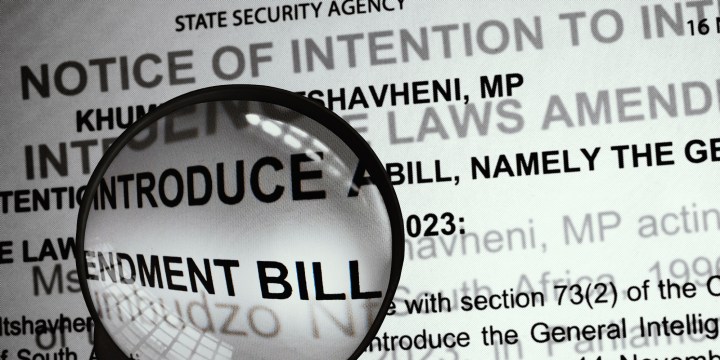SPY BILL OP-ED
South Africa needs national security, but not at the expense of constitutional rights

The absence of safeguards in the General Intelligence Laws Amendment Bill sets a dangerous precedent for mass surveillance in a country with a populace already distrusting of its government at many levels.
Any legislation has to abide by the principles of non-racialism, non-sexism, social justice and economic equality. These are the principles that should root a developmental democratic state founded on the values of social and national democracy.
It is in that spirit that the General Intelligence Laws Amendment Bill, which is currently before Parliament, needs to be assessed.
The pressing need for a legislative framework that upholds national security without compromising the constitutional rights and freedoms that form the foundation of South Africa’s democratic vision is clear.
However, some provisions in the Bill – nicknamed the “Spy Bill” – should concern the proponents of our constitutional order.
Broadened definitions
The first concern is about the Bill’s broadened definitions of threats to national security. The Bill’s approach to expanding these definitions risks unnecessarily encroaching upon the private lives of individuals, potentially stifling free expression and association under the expanding umbrella of national security.
The Bill grants intelligence agencies broad vetting powers over any “person or institution of national security interest”, a definition that could, in its current broad form, encompass private individuals, nonprofit entities, religious organisations and commercial enterprises.
The concern, however, is not as much with the identity of those subjected to scrutiny as with the broad and vague criteria used to define what constitutes a threat to national security.
This is because the criteria, as proposed by the Bill, range from the inappropriate (such as any actions that undermine equality, which is better addressed through civil and human rights remedies) to the utterly vague (such as engaging in activities that are inconsistent with the principles set out in section 198 of the Constitution, which could be almost anything).
This approach raises significant privacy concerns and risks the potential for misuse of these powers, leading to unwarranted invasions of privacy and violations of individual and group rights.
Enhanced surveillance
Enhanced surveillance capabilities proposed by the Bill, particularly through the National Communications Centre, present another area of serious concern.
The introduction of such measures without corresponding oversight mechanisms and privacy safeguards echoes past missteps in surveillance legislation, risking a repeat of historical overreach.
The absence of these safeguards potentially jeopardises the rights to privacy, freedom of expression, and others, setting a dangerous precedent for mass surveillance in a country with a populace already distrusting of its government at many levels.
If one considers the Constitutional Court’s ruling in the amaBhungane case, where the constitutionality of similar provisions of Rica came under scrutiny, it becomes evident that surveillance measures, to be constitutionally valid, must be accompanied by robust safeguards that prevent abuse and ensure accountability.
The amaBhungane ruling highlighted the importance of balancing the state’s surveillance powers with individuals’ rights to privacy and freedom of expression, emphasising the need for legislation that is both effective in safeguarding national security and respectful of constitutional rights.
One understands that this is no small ask of an under-resourced government dealing simultaneously with severe human rights challenges and a captured state in need of improved security.
This must all be viewed through the lens of increasing geopolitical instability and unprecedented, high-risk technological advancements, all of which are increasingly changing the way leaders need to view national security.
However, this does not divest South Africa of its responsibilities to uphold all its obligations under the Constitution, not least of all those contained in the Bill of Rights.
Secret intelligence sector funds
Furthermore, the Bill’s shortcomings in addressing the misuse of secret funds within the intelligence sector are especially concerning given historical instances of State Capture and financial mismanagement.
The Zondo Commission did not shy away from finding that the abuse of such funds played an integral role in State Capture – a warning the drafters of the Bill did not entirely heed.
Effective governance and oversight mechanisms are paramount to ensuring that intelligence funding is used responsibly and for its intended purposes. Without such mechanisms, the risk of fund misuse remains, potentially compromising the integrity of the intelligence services and eroding public trust.
Considering these concerns, we need to advocate for a comprehensive re-evaluation of the Bill to align more closely with constitutional principles and international best practices.
Robust oversight
The definitions of national security threats to focus on direct and immediate risks need to be revised, by implementing robust oversight mechanisms for surveillance activities, enhancing the independence and autonomy of oversight bodies, and establishing clear safeguards against the misuse of secret funds.
The Bill can be significantly improved and the security of the nation, as well as the rights of its people, can be fostered.
As the legislative process unfolds, Parliament is bound by the Constitution to carefully consider these concerns and recommendations, as well as those of the many other interested parties who have made helpful inputs in respect of the Bill.
Fundamental rights and freedoms
The pursuit of national security, while essential, must not override the fundamental rights and freedoms upon which our constitutional and democratic republic is founded.
Civil society will continue to monitor the legislative process of this Bill and stands ready to further contribute to the development of legislation that respects the supremacy of the Constitution and the Bill of Rights.
South Africa has no choice but to evolve its laws and policies to navigate the challenges of national security in an increasingly complex global and domestic landscape.
Parliament’s efforts to engage the public on how best to do this should be appreciated.
But we trust that these inputs and those of others are not paid lip service, especially at this crucial point in our democracy.
With the significant political and socioeconomic uncertainty we presently face as a nation, South Africa cannot afford to falter even slightly in ensuring that wide-reaching and impactful legislation such as this can withstand constitutional muster and scrutiny.
In not doing so, our standing as a beacon for democracy and human rights will be undermined and our global standing diminished.
Therefore, let us remain steadfast in our commitment to a balanced approach that respects both our security needs and our constitutional rights. DM
This article draws on the contents of a legal opinion obtained by the Inclusive Society Institute (ISI) to direct their advocacy work related to the General Intelligence Laws Amendment Bill.
Daryl Swanepoel is the Chief Executive Officer of the ISI.




















 Become an Insider
Become an Insider
Comments - Please login in order to comment.